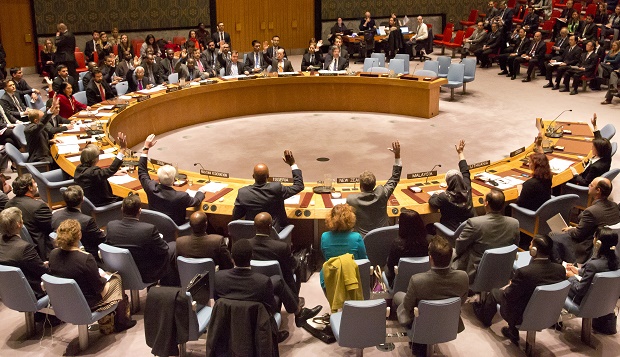UNITED NATIONS, United States—The United Nations warned Syria’s warring parties on Thursday that starvation sieges were a war crime as it pushed for an easing of the dire humanitarian crisis ahead of peace talks, just 11 days away.
France, Britain and the United States called for an emergency meeting of the Security Council to press demands for aid to reach some 400,000 civilians facing starvation in besieged areas.
READ: UN gets $250 million to educate Syrian children, needs more
French Ambassador Francois Delattre told AFP that the meeting to be held Friday from 2000 GMT “will draw the world’s attention to the humanitarian tragedy that is unfolding in Madaya and in other towns in Syria.”
After months of negotiations, a second convoy carrying food and other necessities entered Madaya on Thursday where residents told AFP they had been surviving on soup from boiled grass.
On Monday, a first convoy reached Madaya, where Syrian forces have laid siege for the past six months, and truckloads of aid entered two other towns blockaded by rebel groups.
UN Secretary-General Ban Ki-moon issued his strongest warning to date on the use of sieges as a tactic of war as preparations gathered steam for talks on ending the five-year conflict in Geneva on January 25.
READ: UN Security Council to discuss aid to besieged Syria towns
“Let me be clear: the use of starvation as a weapon of war is a war crime,” Ban told reporters.
“All sides—including the Syrian government which has the primary responsibility to protect Syrians—are committing this and other atrocious acts prohibited under international humanitarian law,” he said.
Ban said Syrians living under siege were “being held hostage”, but added that their plight was even worse: “Hostages get fed.”
“These children and women and men are struggling to survive without food or medicine,” he said.
Aid before talks
Humanitarian aid access is seen as a key confidence-building measure ahead the new round of Syrian peace talks.
Diplomats suggested that the new peace effort would have no chance of success if the humanitarian crisis remains desperate.
“It will be difficult for them to negotiate while their children and close ones are threatened with famine or death,” said a Security Council diplomat.
The United Nations is struggling to deliver aid to about 4.5 million Syrians who live in hard-to-reach areas, including nearly 400,000 people in besieged areas.
The UN envoy for Syria, Staffan de Mistura, said Wednesday that the permanent council members—Britain, China, France, Russia and the United States—had pledged to take “immediate action” to push for deliveries of aid to besieged areas.
The Security Council has adopted resolutions demanding an end to the sieges, but these have been largely ignored.
UN High Commissioner for Human Rights Zeid Ra’ad Al Hussein, speaking in Qatar, said that those responsible for the starvation sieges should face justice.
“Should there be prosecutions? Of course, that should be the case. At the very least there should be accountability for these crimes.”
The Security Council can ask the International Criminal Court to investigate war crimes in Syria but a previous attempt to open up ICC probes was blocked by Russia and China in 2014.
With international pressure building on Syria, a senior Red Cross official said there were prospects for an end to the sieges.
“There is possibly now a window of opportunity based on this positive development to make a significant step forward… in terms of lifting these sieges and stop with these medieval tactics,” said Dominik Stillhart, director of operations at ICRC.
